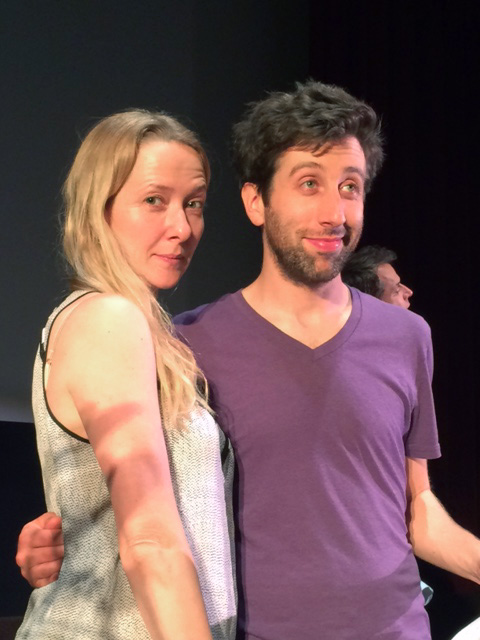Q&A: “God of Carnage” actors discuss differences in various acting mediums

Real life married couple Jocelyn Towne and Simon Helberg will play onstage couple Alain and Annette Reille in L.A. Theatre Works’ production of “God of Carnage.” (Courtesy of Sam McCay)
By Samantha Suman
June 23, 2016 2:07 p.m.
Simon Helberg said acting in a radio play is a completely different muscle of the performance business.
Helberg, who plays Howard Wolowitz on “The Big Bang Theory,” and his wife Jocelyn Towne will perform in L.A. Theatre Works’ production of “God of Carnage” at UCLA’s James Bridges Theater from Thursday through Sunday. Helberg will play Alain Reille, a father and successful lawyer. Towne, who both directed and starred in “I Am I,” will play his onstage wife, Annette Reille, a mother who works in wealth management.
From minimal rehearsal time to simple run throughs, the radio play has no elaborate costumes or set pieces – voices and live sound effects alone will be recorded for later use on public radio.
Regardless of each medium’s structure, Helberg said his past experiences as an actor have paved the way for his newest project.
The Daily Bruin’s Samantha Suman spoke with Helberg and Towne about their experiences preparing for “God of Carnage,” performing in a radio play and playing an onstage couple.
Daily Bruin: What drew the two of you to audition for “God of Carnage”?
Jocelyn Towne: We did not audition for this play. We were offered the roles, and we happened to have seen the play. Simon saw it in New York and in Los Angeles, and I saw it in Los Angeles …
If you look at (the characters) at first glance they have certain qualities that you’d think would be almost like a caricature. Then you realize they have so many facets to their personalities that actually seem to contradict each other, and they’re such complicated people … We have our social self that we present to strangers and then we have a sort of shadow self, and that comes out very close to the surface. But we hide it most of the time.
DB: How has it been to play husband and wife onstage, and does this relationship at all resemble your real life relationship?
Simon Helberg: There are definitely moments where certain things ring true, unfortunately. Usually because the play casts a light on the really most primal law – sort of awful parts of people … I think our relationship on stage – it helps to have a history together. People can get very petty or be very selfish, and that’s some of the things that this play explores, and I guess we probably explored those things in our real life as well.
JT: Yeah, whether or not the actual facts or storylines that Annette and Alain are going through are necessarily the same as ours, we definitely have had our moments of having problems with each other … It’s been a lot of fun so far to get to feel the authenticity of a real issue or fight that we may have had and transpose it to a theatrical one.
DB: What from your past experiences as actors has prepared you for your roles in “God of Carnage”?
SH: You’re really operating on instinct. Having worked for enough time between theater or film and TV – having just done enough work – you just build up the muscle and you try to trust your instincts more.
JT: You have to learn to trust the medium of the radio play, which is facing out towards the audience for all of the conversations that you would (have) in real life or naturally or on a theater stage playing to the other character. You’re actually playing to the fourth wall, the audience.
DB: How does performing in a play differ from acting in film and on television?
SH: The physicality of it is completely different, mainly. it depends on what kind of television or film. Usually with film, you’re in much closer shots. You are either in a close up or you’re not generally seeing head to toe, and you have to perform sort of based on where the camera is. Whereas in theater, you’re using your whole body. People are able to move their heads around, and the entire stage has to be alive…
But honestly I don’t think it’s as different as people might tend to say it is … You want to be careful with gesticulating a ton on film if they are shooting very close. It looks a lot bigger on screen than it does on stage, but really those are just tiny technical things. Ultimately, you are just trying to be truthful and be open.
JT: You are serving the play in a certain way that is very specific to this medium – being very vocally aware that the only way your audience is going to be able to understand the play is though vocalization … it definitely makes me think a lot more about my vocal quality.
SH: Yeah it’s just like in film. If they are shooting you close, you don’t really have to wear pants.

